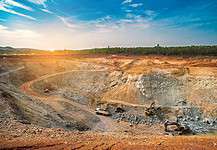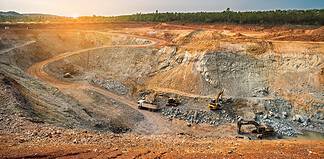 INDIAN conglomerate Adani is a step closer to opening Australia’s biggest coal mine, after the Queensland Government granted approval for the $16.5 billion Carmichael mine.
INDIAN conglomerate Adani is a step closer to opening Australia’s biggest coal mine, after the Queensland Government granted approval for the $16.5 billion Carmichael mine.
Federal approval is still required for the proposed 10 billion tonne project, 160km northwest of Clermont in Queensland’s northern Galilee Basin. The project includes the construction of six open cut and five underground mines; a 189km rail line; on and offsite processing facilities and water supply infrastructure; and a workers’ accommodation village and airport.
The mine is expected to produce 60 million tonnes per annum of thermal coal during a 90-year operating life, with the first coal shipment forecast for 2016. The project has the potential to create up to 2500 construction and 3900 operational jobs. Carmichael’s proposed rail line would connect the mine to the existing Goonyella rail network. All coal products would be exported via the controversial Abbot Point port, predominantly to the Indian market.
Adani chief executive Australia Harsh Mishra welcomed the government’s decision. “We have already made a significant investment in Australia with our purchase of the Port of Abbot Point and our plans for a thermal coal mine that will produce up to 60mtpa, which will have to be transported by rail to the port for export,” Mr Mishra said. However, landholders and environmentalists across Clermont and the Isaac Region have labelled Carmichael an “environmental disaster”.
“The mine would have devastating impacts on water resources and local landholders would forever be paying the price,” anti-coal group Lock the Gate national president Drew Hutton said. The Commonwealth’s own advisory body, the Independent Expert Scientific Committee for Coal Seam Gas and Large Mining Developments, similarly raised serious water and environmental concerns about the development.
However, Queensland Deputy Premier and State Development, Infrastructure and Planning minister Jeff Seeney said the approval was subject to 190 strict environmental protection conditions, including mandatory agreements with landowners on groundwater.
“If it proceeds, the Carmichael project would not only be the largest coalmine in Australia but one of the largest in the world. It would also be a vital project in opening up the hugely significant Galilee Basin,” Mr Seeney said.
“The stringent and wide-ranging conditions set by the Coordinator-General include protections for local flora, landholder interests, groundwater resources, the quality of surface water leaving the project site, air quality, and noise and dust levels.
“In relation to groundwater and water bores, Adani will be required to reach make-good agreements with all affected landholders including the identification and provision of alternative water supplies.”
Adani admitted that the development would lead to “unavoidable vegetation clearing” on land where the endangered black-throated finches live.
The Abbott Government must now decide whether to back the state, or its own governmental advisory body. Federal Environment minister Greg Hunt received a 600 page report from Queensland’s Coordinator-General’s to aid the decision.










































